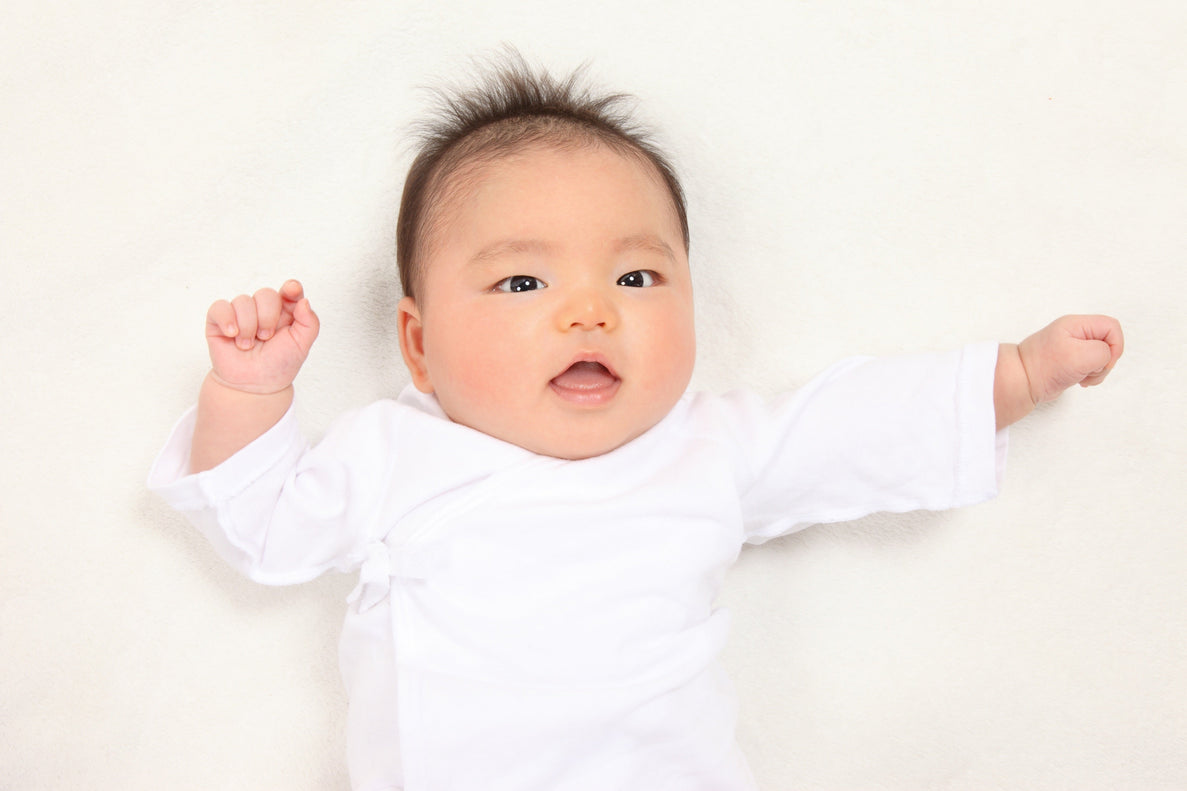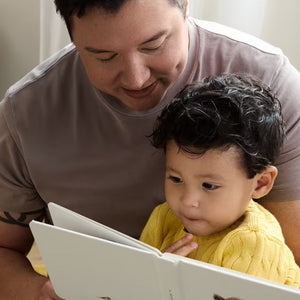You’ve reached the two-month mark with your sweet baby, and both of you have learned so much already. I’d love to show you a 2 month old sleep and feeding schedule and answer the most common questions I get about 8, 9, 10, and 11 week olds.
First, when it comes to sleep and feeding, my motto is “flexible routine, not rigid schedule.” We want to work with babies right where they are developmentally, which means watching your 8, 9, 10, or 11 week old's wake windows and cues rather than trying to follow an exact schedule.
2 Month Sleep Schedule Guidelines
Every baby is unique and your little one’s day will depend on when your baby wakes, how long your baby naps, and individual cues. During the newborn months, it’s okay and to be expected that naps will vary quite a bit each day. These age-appropriate guidelines are not intended to be a rigid schedule, simply a guide for setting up a flexible routine.
Daytime Feedings: Every 2-3 hours
Sweet Spot Bedtime: 7-8 pm or 8-10 pm depending on your baby
Number of Naps: 4-6
Wake Windows: 60-90 minutes
For more details on these recommendations, keep reading.
What is a sample 2 month old sleep schedule?
A 2 month old needs a schedule that flexes based on their individual needs. It’s important to be responsive to sleepy cues, feeding needs, and your baby’s nap lengths. Here is one example of how a schedule might look for a two month old:

Text version of 2 Month Old Sample Schedule
| Time | Activity |
|---|---|
| 6:30am | Wake and feeding |
| 7:30am-9:30am | Nap |
| 9:30am | Feeding |
| 10:35am-11:05am | Nap |
| 11:45am | Feeding |
| 12:20pm-1:40pm | Nap |
| 2:40pm | Feeding |
| 3:00pm-4:30pm | Nap |
| 5:00pm | Feeding |
| 5:45pm-6:45pm | Nap |
| 7:45pm | Feeding |
| 8:15pm | Bedtime |
What are wake windows for a 2 month old?
A baby’s wake window is simply how long they stay awake between naps. At two months, your baby will need about 60-90 minute wake windows.
When they're closer to 8 weeks, your baby's wake windows might be on the shorter end of that range, but when your baby is 11 weeks, you'll see those wake windows expand to the longer end of the range. We also see that wake windows are often shortest in the morning and grow throughout the day, with the longest wake window before bedtime.
Remember that wake windows are a guide. Sleepy cues will help you best know when your 2 month old baby is ready for sleep. If you’re not sure whether your baby is tired at 60 or 90 minutes, watch for sleepy cues to know when it’s time to put them down for a nap or go to bed.
How much total sleep should a 2 month old have? How long should a 2 month old sleep?
At two months old, we’re still following your baby’s lead with how much sleep they need. Here are a few things to keep in mind:
-
Don’t let any one nap go longer than 2 hours.
-
Aim for wake windows around 60-90 minutes.
-
Don’t let your baby’s night last any longer than 12-12.5 hours.
How many naps are best for a 2 month old?
There isn’t a set number of naps that works best for a 2 month old. Here’s why: during these first months, it’s normal to see naps last anywhere from 20 minutes to 120 minutes. I know, that’s a wide range, but short naps are developmentally appropriate at this age. So while two month old babies typically take 4-6 naps per day, know that the number of naps will vary each day depending on nap lengths.
How long should a 2 month old nap?
There is a wide range of “normal” with a two month old’s naps. Healthy, normal naps can range from 20 minutes to 2 hours. If your baby likes to nap on the longer end, I do recommend you wake your 2 month old after 2 hours.
I know you've probably heard that you should never wake a sleeping baby, but this is a time when I’ll encourage you to go ahead and do it. Babies need that important awake time to ensure they get the number of calories they need during the day, to help them with day-night confusion, and to work towards longer stretches of sleep at night.
Why is my 2 month old taking short naps?
Many 2 month old babies are simply not developmentally ready to consistently take long naps. But there are some other culprits of short naps for 2 month olds, like:
-
Being overtired
-
Not being tired enough
-
Hunger
-
Sleep environment
-
Waking themselves during active sleep
When is bedtime for a 2 month old?
There isn't a universal answer to this. Some 2 month old babies do best with a 7:00-8:00 pm bedtime. When kept up past 8:00 pm, these babies start to become fussy and overtired. On the other hand, some 2 month old babies thrive with a nap around 7:00 pm and bedtime between 8:00 and 10:00 pm. It’s all about finding what works for your baby. If you need a bit more guidance, check out my blog on False Start Bedtimes, which can help you choose the best option.
What are developmental milestones for a 2 month old?
It’s exciting as a parent to watch your baby learn new things! Please keep in mind that milestones aren’t deadlines your baby has to meet. Milestones are based on ranges, and every baby is different. If your sister’s baby started smiling at 8 weeks, but your baby hasn’t, there is no need to panic. That first beautiful smile could be days away! If you have any concerns about your baby hitting their milestones, make sure to speak with your pediatrician.
At two months old, your baby may start to:
-
Move their head back and forth more easily while laying on their back
-
Hold their head up for about 2 seconds during tummy time
-
Cry to ask for attention
-
Smile at the sound of your voice or voices of other familiar caregivers
-
Make “pre-talking” noises like squealing and gurgling
-
Try to grab their feet or stare at their hands
Is there a 2 month old sleep regression? Is there an 8 week, 9 week, 10 week, or 11 week regression?
Sleep regressions are simply a progression in development that makes sleep tricky for a short period. At two months old, your baby is constantly learning about the world around them, and sometimes this can make sleep difficult.
If you’re dealing with sleep struggles around 8, 9, 10 or 11 weeks, ask yourself:
-
Is your 2 month old getting full feedings or only snacking during the day? If your baby isn’t getting all of their daytime calories, this could be why they’re waking more during the night.
-
Is your 2 month old actually awake or are they going through a period of active sleep? Babies experience REM sleep differently than we do, and what appears to be an awake baby could just be a sign of active sleep.
What are some 2 month old baby activities?
Now that your baby’s wake windows are a bit longer, there's more time for play. At 2 months old, everything can be play. Let me show you a few examples of how to play with your two month old:
-
Make funny faces. Your baby loves to watch your face move as you talk and smile - this month you might even start to see smiles!
-
Tummy time. Our goal is at least 15-30 minutes of tummy time per day. It doesn’t all have to happen at one time, so break it into smaller sessions throughout your baby’s day.
-
Go for a walk. Engage with your baby by telling them what you’re seeing and hearing.
-
Look at simple board books. Reading aloud and describing what you see promotes language development.
-
Sing to your baby. You don’t need to limit yourself to baby music. Sing whatever songs you enjoy listening to or play some music and dance with your baby.
I have some favorite toys for a two month old here.
Does the AAP recommend to stop swaddling at 8 weeks?
The AAP does not state a specific age for when to stop swaddling. The current AAP recommendation is to stop swaddling “when an infant exhibits signs of attempting to roll.” (1,5). Babies typically begin showing signs of rolling around 3 to 4 months (1). Since every baby develops at their own pace, some babies may show signs of rolling earlier.
If your 2 month old is starting to show signs of rolling, it’s time to transition out of the swaddle.
Why does my 2 month old fight sleep?
When babies fight sleep, this is usually a result of being overtired or overstimulated. Watch those wake windows (60-90 minutes) and sleepy cues to make sure your baby is going down for a nap or bedtime when sleepy.
If you’re still struggling with getting your baby to sleep, my Newborn Sleep Bundle lays everything out with all my best tips and leads you step-by-step towards sleep success. I can help you lay a healthy foundation for great sleep without any crying.
Why is my 2 month old so fussy?
It can be so normal to see an increase in fussing and crying around 6-8 weeks. Maybe you're wondering if you have a colicky baby.
If you’re noticing your 2 month old baby is often fussy in the late afternoon or early evening, you might be experiencing the witching hour. Read my blog on the Witching Hour for Babies to learn more about it and how to work through it.
If your 2 month old seems fussy all the time, rarely content, you might be seeing a sign of a physical need. The three most common culprits we see around two months are overtiredness, hunger, or discomfort like reflux. Pay close attention to your baby's cues and follow up with your baby's doctor if you're seeing a constantly fussy baby.
My 2 month old is sleeping a lot. Should I be concerned?
Typically, babies don’t sleep more than they need to during a 24 hour period. Some two month olds may still be experiencing day-night confusion, which usually resolves during this month. Check out my tips for helping your sleepy baby. BUT, if your baby is much sleepier than normal, difficult to wake, seems lethargic, or you have any other concerns, I want you to talk with your doctor.
How do I get my 2 month old to sleep?
We often think that babies will just sleep when they are tired and that sleep comes naturally to newborns. The truth is that sometimes we have to help newborns learn how to be great little sleepers. My Newborn Sleep Bundle will help you set your days and nights up for success, learn your baby's cues, calm a fussy baby, and so much more. I want to help you lay a healthy sleep foundation for your baby and love the newborn stage.








